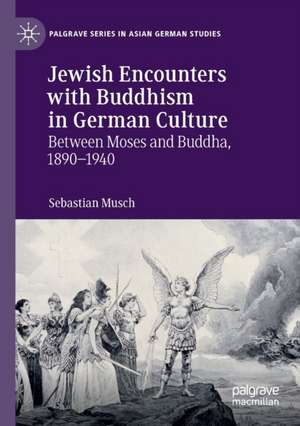Jewish Encounters with Buddhism in German Culture: Between Moses and Buddha, 1890–1940: Palgrave Series in Asian German Studies
Autor Sebastian Muschen Limba Engleză Paperback – 21 oct 2020
| Toate formatele și edițiile | Preț | Express |
|---|---|---|
| Paperback (1) | 638.24 lei 6-8 săpt. | |
| Springer International Publishing – 21 oct 2020 | 638.24 lei 6-8 săpt. | |
| Hardback (1) | 643.65 lei 6-8 săpt. | |
| Springer International Publishing – 21 oct 2019 | 643.65 lei 6-8 săpt. |
Preț: 638.24 lei
Preț vechi: 750.88 lei
-15% Nou
Puncte Express: 957
Preț estimativ în valută:
122.16€ • 127.05$ • 102.37£
122.16€ • 127.05$ • 102.37£
Carte tipărită la comandă
Livrare economică 13-27 martie
Preluare comenzi: 021 569.72.76
Specificații
ISBN-13: 9783030274719
ISBN-10: 3030274713
Pagini: 289
Ilustrații: IX, 289 p.
Dimensiuni: 148 x 210 mm
Greutate: 0.36 kg
Ediția:1st ed. 2019
Editura: Springer International Publishing
Colecția Palgrave Macmillan
Seria Palgrave Series in Asian German Studies
Locul publicării:Cham, Switzerland
ISBN-10: 3030274713
Pagini: 289
Ilustrații: IX, 289 p.
Dimensiuni: 148 x 210 mm
Greutate: 0.36 kg
Ediția:1st ed. 2019
Editura: Springer International Publishing
Colecția Palgrave Macmillan
Seria Palgrave Series in Asian German Studies
Locul publicării:Cham, Switzerland
Cuprins
1. Introduction.- 2. Buddhism and German-Jewish Orientalism.- 3. The Buddha, the Rabbis, and the Philosophers: Rejections and Defenses.- 4. The Bridgebuilders: Jewishness between Asia and Europe.- 5. The Assimilation and Dissimilation of a Jewish Buddhist: Walter Tausk's Contested Identities.- 6. Conclusion: Towards a Study of Jewish-Buddhist Relations.
Recenzii
“This is for scholarship to come, which will undoubtedly find, in addition to students, academics, and a wider audience thirsty to understand more about the phenomenon of Jewish Buddhists, great inspiration and solid material in these two pioneering publications.” (Mira Niculescu, Journal of Buddhist Ethics, Vol. 28, 2021)
“The book contributes to the emerging field of Asian-German Studies and appeals to scholars of Jewish Studies, German Studies, Orientalism, and Postcolonial Studies.” (H-Net Reviews Humanities and Social Sciences, January 28, 2020)
“The book contributes to the emerging field of Asian-German Studies and appeals to scholars of Jewish Studies, German Studies, Orientalism, and Postcolonial Studies.” (H-Net Reviews Humanities and Social Sciences, January 28, 2020)
Notă biografică
Sebastian Musch is a research fellow in the Department of History at Osnabrück University, Germany.
Caracteristici
Traces the entanglement of Buddhism and Judaism in German culture from the turn of the century up to World War II Applies postcolonial theory to show the fluidity of and to underline the inherent hybridity of the German-Jewish self-understanding Highlights the forces of antisemitism that shaped the reception of Buddhism in German culture Appeals to scholars of Jewish Studies, Asian German Studies, Orientalism, and Postcolonial Studies









